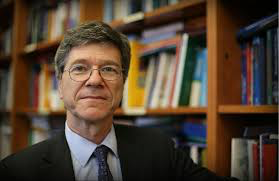Published: May 16,2023
By Gerald Mbanda

American Economist Jeffrey Sachs, the director of the Center for Sustainable Development at Columbia University, said that a lot of the tension between the US and China arises from the US side.
“This is the US’ mistake, because some Americans think that if China is rising, the US must be losing,” Sachs said. He further observes that, this kind of thinking is false. “Economics is a win-win cooperative game.” In his article titled, “The West False Narrative about Russia and China” published in August 2022, Prof. Sachs says that the rentless Western narrative that the West is noble while Russia and China are evil is simple minded and extraordinarily dangerous. “It is an attempt to manipulate public opinion, not to deal with very real and pressing diplomacy. The American Economist is well known for his candid and straight forward criticism of US Foreign Policy towards China and Russia.
As China and US officials met recently in the Austrian capital Vienna, political analysts keep questioning when such meetings will translate into tangible results that will bring about a mood of trust and mutual cooperation between the two biggest economies in the world. According to Sachs, such question is not likely to get a positive answer anytime soon. For him, the Western narrative is at the centre of the US national security strategy where China and Russia are falsely viewed in the image of “attempting to erode American security and prosperity.”
President Joe Biden has promoted this narrative, declaring that the greatest challenge is the competition with the ‘autocracies’, which “seek to advance their own power, export and expand their influence around the world, and justify their repressive policies and practices as more efficient way to address today’s challenges.” US security strategy is not the work of any single US president but of the US security establishment which is largely autonomous and operates behind a wall of secrecy, Prof. Jeffrey Sachswrote.
Prof. Sachs observes that the combined GDP of the G7 countries is less than that of the BRICS (Brazil, Russia, India, China and South Africa), and the G7 population is just 6 percent compared to 41 percent of the BRICS, and the reason US undermines China and Russia is an attempt to remain the world’s hegemonic power, by augmenting military alliances around the world to contain or defeat China and Russia. “There is one country whose self-declared fantasy is to be the world’s dominant power: the US,” Sachs says. He further observes that the US should have recognized the true sources of security, which is internal and social cohesion and responsible cooperation with the rest of the world rather than the illusion of hegemony.
It is high time the US and its allies revised their foreign policy to avoid war with China and Russia. Despite Prof. Sachs wise counsel, today, the US and its NATO allies are already engaged in a proxy war with Russia in the Russia-Ukraine conflict and the US is provoking another proxy war with China in the Taiwan straits. My simple and humble question here is that how can talks between US and China give security assurance for noninterference in China’s internal affairs by stopping arms supply to Taiwan?
Gerald Mbanda is a Researcher and publisher on China and Africa.
For comments or opinion write to us on info@africachinareview.com
 Africa -China Review Africa -China Cooperation and Transformation
Africa -China Review Africa -China Cooperation and Transformation
